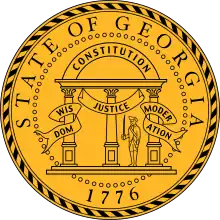| Lieutenant Governor | |
|---|---|
 Georgia state seal | |
| Government of Georgia | |
| Appointer | Elected by popular vote |
| Term length | 4-years, no term limit |
| Inaugural holder | Melvin E. Thompson |
| Formation | 1945 |
| Website | Government website |
The lieutenant governor of Georgia is a constitutional officer of the State of Georgia, elected to a four-year term by popular vote. Unlike in some other U.S. states, the lieutenant governor is elected on a separate ticket from the governor of Georgia.
Constitutionally, the lieutenant governor's primary job is to serve as president of Georgia's Senate. In the case of incapacity of the governor, the lieutenant governor assumes the powers (but not the title) of the governor. Should the governor die or otherwise leave office, the lieutenant governor becomes governor for the remainder of the term of office.
The office of Lieutenant Governor was created by a state constitutional revision in 1945. Prior to that time, Georgia did not have such an office. Elected in 1946 (for a term to begin in 1947) Georgia's first lieutenant governor, Melvin E. Thompson became involved in the three governors controversy.
The current lieutenant governor of Georgia is Republican Burt Jones.
History
The office of lieutenant governor in Georgia was created by an amendment to the state constitution in 1945. The primary purpose of the office was for its incumbent to serve as a successor in the event the governorship became vacant. Melvin E. Thompson became the first person elected to the office in 1946. Due to the outcome of the three governors controversy, he never served in the office, instead succeeding to the governorship pending a special election in 1948. That year, Marvin Griffin was elected to the lieutenant governorship. Griffin establish several informal precedents during his tenure, namely by assuming an active leadership role in the State Senate and by naming chairs of the body's committees with the governor's assent. In 2003, the Senate altered its rules and granted the power of appointing committee chairs to the Senate president pro tempore.[1] In November 2010, the Republican majority voted to change the Senate rules, stripping the Lieutenant Governor's ability to appoint the membership of Senate committees.[2]
Election
All candidates for the office of lieutenant governor must also have been a citizen of the United States for at least 15 years and a resident of Georgia for at least six years preceding election. The lieutenant governor is elected on their own ticket separate from the governor. They serve without term limits.[1]
Powers, duties, and structure

The lieutenant governor's formal duties are limited by the Georgia State Constitution to serving as the President of the Senate and the successor of the governor whenever the governorship becomes vacant due to the governor's death or a determination by the State Supreme Court that they are incapable of discharging their duties. The lieutenant governor assumes the gubernatorial powers and duties pending the next general election in the state.[1]
As President of the Senate the lieutenant governor presides over debate in the Senate and casts a tie-breaking vote in that body if necessary. However, the lieutenant governor is barred from sponsoring legislation.[3] The Rules of the Georgia State Senate assign the president of the Senate to appoint two senators to the Committee on Assignments and to serve as the Chair of the committee, but the Chair may only vote in case of a tie. Additionally, the president is a member of and appoints three other members to the Committee on Administrative Affairs. Under the supervision of the State Senate, the President "shall as a matter of course and without debate, report the reference of bills to the proper committee." Senate pages are supervised by the president who "shall establish a program of familiarization with state government, its procedures and those duties and responsibilities which will be required of pages."[4] As the Senate's presiding officer, the lieutenant governor can exercise influence over state legislation, though the Senate can disregard their wishes at its discretion.[5]
List of lieutenant governors of Georgia
- Parties
Democratic (10) Republican (3)
| No. | Lt. Governor | Term in office | Party | Election | Governor | |||
|---|---|---|---|---|---|---|---|---|
| 1 |  |
Melvin E. Thompson | January 14, 1947 – March 18, 1947 |
Democratic | 1946 | Herman Talmadge | ||
| — | Vacant | March 18, 1947 – November 17, 1948 |
— | Melvin E. Thompson | ||||
| 2 | .gif) |
Marvin Griffin | November 17, 1948 – January 11, 1955 |
Democratic | 1948 (special) |
Herman Talmadge | ||
| 1950 | ||||||||
| 3 | .jpg.webp) |
Ernest Vandiver | January 11, 1955 – January 13, 1959 |
Democratic | 1954 | Marvin Griffin | ||
| 4 | .png.webp) |
Garland T. Byrd | January 13, 1959 – January 15, 1963 |
Democratic | 1958 | Ernest Vandiver | ||
| 5 | .png.webp) |
Peter Zack Geer | January 15, 1963 – January 11, 1967 |
Democratic | 1962 | Carl Sanders | ||
| 6 |  |
George T. Smith | January 11, 1967 – January 12, 1971 |
Democratic | 1966 | Lester Maddox | ||
| 7 |  |
Lester Maddox | January 12, 1971 – January 14, 1975 |
Democratic | 1970 | Jimmy Carter | ||
| 8 |  |
Zell Miller | January 14, 1975 – January 13, 1991 |
Democratic | 1974 | George Busbee | ||
| 1978 | ||||||||
| 1982 | Joe Frank Harris | |||||||
| 1986 | ||||||||
| 9 |  |
Pierre Howard | January 13, 1991 – January 11, 1999 |
Democratic | 1990 | Zell Miller | ||
| 1994 | ||||||||
| 10 |  |
Mark Taylor | January 11, 1999 – January 8, 2007 |
Democratic | 1998 | Roy Barnes | ||
| 2002 | Sonny Perdue | |||||||
| 11 |  |
Casey Cagle | January 8, 2007 – January 14, 2019 |
Republican | 2006 | |||
| 2010 | Nathan Deal | |||||||
| 2014 | ||||||||
| 12 | .jpg.webp) |
Geoff Duncan | January 14, 2019 – January 9, 2023 |
Republican | 2018 | Brian Kemp | ||
| 13 | .jpg.webp) |
Burt Jones | January 9, 2023 – Incumbent |
Republican | 2022 | |||
See also
References
- 1 2 3 Buchanan, Scott E. (March 11, 2003). "Lieutenant Governor". New Georgia Encyclopedia. Georgia Humanities, University of Georgia Press. Retrieved June 26, 2023.
- ↑ Tharpe, Jim (November 17, 2010). "Georgia Senate leaders claim "power sharing" with lieutenant governor". PolitiFact. Retrieved 11 October 2013.
- ↑ "State of Georgia". Georgia County Snapshots. Georgia Department of Community Affairs. 2006. Archived from the original on April 29, 2007. Retrieved June 27, 2023.
- ↑ "Rules of the Georgia State Senate | 2013 - 2013 Term" (PDF). Secretary of the Senate's Office. Retrieved 11 October 2013.
- ↑ Hurt, Emma (January 11, 2023). "Exclusive: Georgia's new lieutenant governor's priorities". Axios Atlanta. Axios Media. Retrieved June 26, 2023.